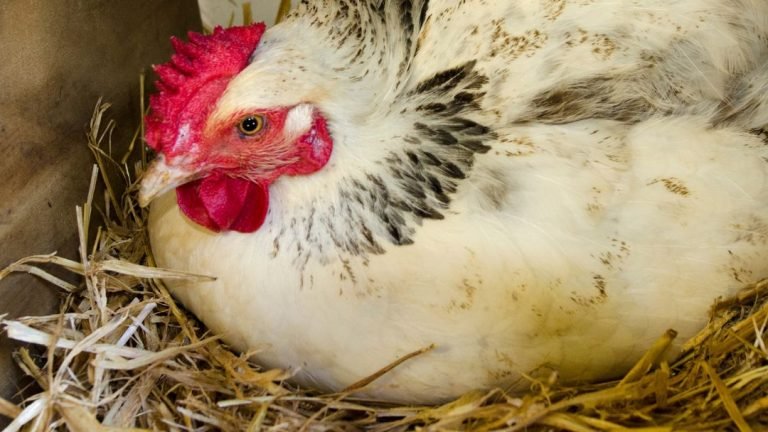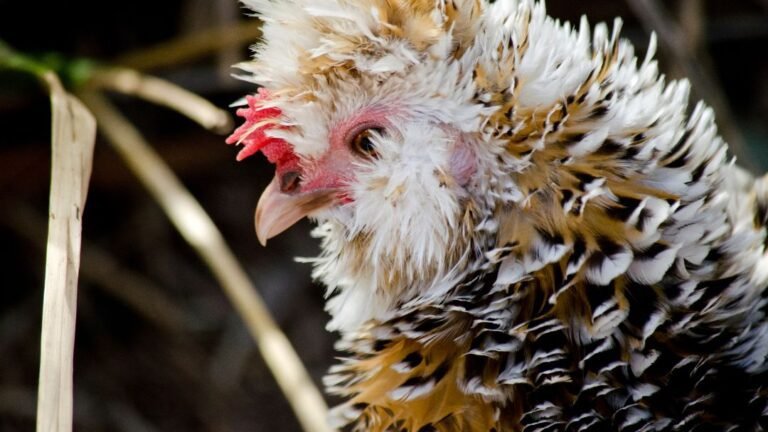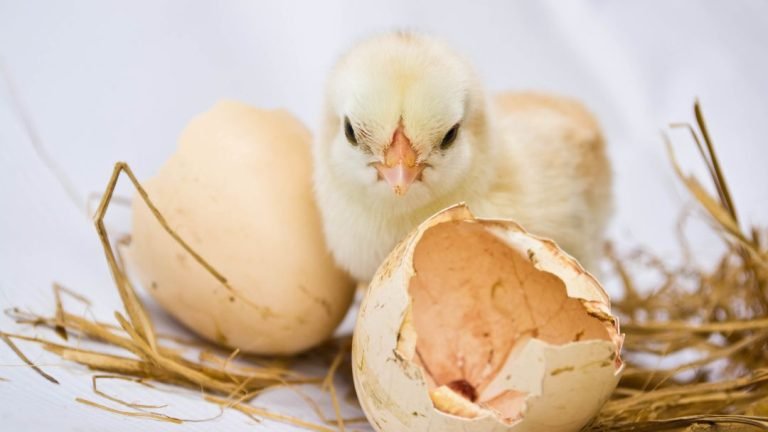Sour crop in chickens is a condition that affects the digestive system and results in a fermentation process in the crop, causing a foul odor and discomfort for the bird. Sour crop is a digestive disorder that can affect chickens, leading to a fermentation process in the crop, causing an unpleasant smell and discomfort.
This condition occurs when the crop, the bird’s food storage organ located in the neck, becomes overloaded or obstructed, resulting in the fermentation of food instead of proper digestion. It is important for chicken keepers to be aware of and address sour crop promptly, as it can lead to more serious health issues if left untreated.
We will explore the causes, symptoms, and treatment options for sour crop in chickens, providing valuable insights for poultry enthusiasts.
Signs Of Sour Crop In Chickens: What To Look Out For
Distended Crop
The first sign to look out for to determine if your chicken has sour crop is a distended crop. The crop is the part of the chicken’s digestive system where food is stored before it moves to the stomach for digestion. Normally, the crop should feel soft and pliable, but when there is an overgrowth of yeast or bacteria, it can become swollen and firm to the touch. If you notice your chicken’s crop is swollen and doesn’t feel normal, it could be a sign of sour crop.
Foul-smelling Breath
Another indication of sour crop in chickens is foul-smelling breath. When yeast or bacteria overgrow in the crop, it can cause fermentation of the food inside, leading to an unpleasant odor. If you detect a strong, sour smell coming from your chicken’s mouth or crop area, it is a clear sign that your bird may be suffering from sour crop.
Decreased Appetite
One of the primary symptoms of sour crop in chickens is a decreased appetite. The overgrowth of yeast or bacteria in the crop can cause discomfort and pain for the chicken, making it reluctant to eat. If you notice that your chicken is not showing the same level of interest in its food as usual, or if it’s eating significantly less, it could be an indication of sour crop.
Weight Loss
Weight loss can be a significant sign of sour crop in chickens. When their crop is not functioning properly due to an overgrowth of yeast or bacteria, the chicken’s digestive system struggles to absorb nutrients from food efficiently. As a result, the bird may experience weight loss. If you notice that your chicken is losing weight despite eating less, it’s crucial to investigate the possibility of sour crop.
Lethargy
Lethargy is a common symptom associated with sour crop in chickens. The presence of an overgrown yeast or bacterial population in the crop can cause discomfort and pain, leading to a lack of energy and overall lethargy in the affected bird. If you observe that your chicken is unusually inactive, listless, or lacking its usual vigor, it’s important to consider the possibility of sour crop as the underlying cause.
Healthy Diet And Feeding Tips
Providing a balanced diet is crucial for the overall health and well-being of your chickens. A nutritious and well-rounded diet not only helps prevent various health problems but also supports optimal digestion and nutrient absorption. In this section, we will discuss some important feeding tips to help keep your feathered friends happy and healthy.
Provide A Balanced Diet
A balanced diet for chickens should consist of a combination of grains, proteins, vegetables, fruits, and minerals. It’s important to ensure that the chickens receive all the necessary nutrients for their growth and development. Here’s an example of a balanced diet for chickens:
| Food Group | Suggested Foods |
|---|---|
| Grains | Corn, barley, wheat |
| Proteins | Insects, worms, soybeans |
| Vegetables | Leafy greens, carrots, broccoli |
| Fruits | Apples, berries, melons |
| Minerals | Crushed oyster shells, grit |
Remember, it’s important to offer a variety of foods to meet their nutritional needs. This will also help keep your chickens interested in their meals and prevent boredom.
Avoid Overfeeding
While it’s important to ensure that your chickens receive enough food, overfeeding can lead to various health issues, including sour crop. Overloaded crops can obstruct the digestive system, causing fermentation of the food. To avoid this, feed your chickens appropriate portions and monitor their consumption. Generally, a healthy adult chicken will consume around 1/4 to 1/2 pound of feed per day, but this can vary depending on the breed, size, and activity level. Adjust the portion sizes accordingly.
Offer Grit For Digestion
To aid digestion, chickens require grit – small stones or insoluble particles that help break down food in the gizzard. Grit acts as a grinding agent, helping the mechanical breakdown of food particles in the digestive tract. You can provide commercial grit specifically made for chickens or offer crushed granite or eggshells. Make sure to offer grit separately in a different dish and ensure it is always available for your chickens to consume.
Limit Access To Spoiled Feed Or Vegetation
Spoiled or moldy feed can pose a serious threat to your chickens’ health, leading to digestive issues such as sour crop. Always store feed in a cool, dry place and check for signs of spoilage regularly. Additionally, restrict their access to vegetation that may be contaminated or rotting. This will help prevent ingestion of harmful bacteria and toxins, reducing the risk of sour crop and other related ailments.
Maintaining Good Hygiene And Cleanliness
Maintaining good hygiene and cleanliness is essential to prevent sour crop in chickens. Sour crop is a condition where the crop, a part of the chicken’s digestive system, becomes impacted and fermentation occurs, leading to discomfort and other health issues. By following proper hygiene practices, you can minimize the risk of sour crop and ensure the overall health of your flock.Keep The Coop Clean And Dry
Keeping the chicken coop clean and dry is crucial in preventing sour crop. Moisture and buildup of waste can create an environment favorable for bacterial growth, increasing the chances of sour crop development. Here are some tips to maintain a clean and dry coop:- Regularly remove droppings and soiled bedding from the coop. This will help prevent the accumulation of moisture and bacteria.
- Ensure proper ventilation in the coop to minimize humidity levels. Good airflow will help in drying out the coop faster.
- Inspect the coop regularly for any leaks or areas where water may be seeping in. Repair any leaks promptly to prevent moisture buildup.
- If you notice damp bedding, replace it with fresh and dry bedding material.
Remove Wet Bedding Regularly
Wet bedding can contribute to the growth of bacteria and fungi, increasing the risk of sour crop. Regularly removing wet bedding is crucial in maintaining a clean and healthy environment for your chickens. Here’s what you should do:- Monitor the bedding for dampness daily.
- If you notice any areas of wet or soiled bedding, remove it and replace it with fresh, dry bedding.
- Consider using materials such as straw or shavings that absorb moisture effectively.
- Regularly sanitize the coop by using appropriate disinfectants to kill any bacteria that may be present.
Provide Clean And Fresh Water
Clean and fresh water is essential for your chickens’ overall health and well-being. Dirty or contaminated water can contribute to the development of sour crop. Follow these guidelines to ensure your chickens have access to clean water:- Regularly clean and refill water containers to prevent the buildup of algae, bacteria, and other contaminants.
- Use clean containers made specifically for chicken water to avoid any potential leaching of harmful substances.
- Position water containers at a suitable height to prevent dirt, droppings, or bedding from falling into them.
- Consider using nipple or cup waterers that minimize splashing and contamination.
Regularly Clean Feeding And Watering Equipment
Regular cleaning of feeding and watering equipment is vital to prevent the growth of bacteria and reduce the risk of sour crop. Here’s what you need to do:- Dismantle and thoroughly clean feeders and waterers on a regular basis.
- Use a mild detergent and warm water to scrub away any residue or debris.
- Rinse the equipment thoroughly to remove any traces of detergent.
- Allow the equipment to air dry or use clean towels to dry them before refilling.
- Inspect the equipment for any signs of damage or mold growth. Replace or repair if necessary.
Mild Cases: Home Remedies
Mild Cases: Home Remedies
When it comes to sour crop in chickens, mild cases can often be effectively treated at home. While it is always crucial to consult a veterinarian for severe cases, some simple remedies can help alleviate the symptoms and promote a healthy recovery. Here are a few home remedies that have been found to be beneficial for chickens suffering from mild sour crop:
Yogurt And Probiotics
Yogurt and probiotics are known for their beneficial bacteria, which can help restore the balance in a chicken’s digestive system. The good bacteria in these supplements aid in breaking down the impacted material in the crop, reducing inflammation and promoting smoother digestion.
Epsom Salt Water Flush
An Epsom salt water flush can help flush out the impacted material in a chicken’s crop. This remedy involves a gentle flushing of the crop with a mixture of warm water and Epsom salt. The water flushes out the accumulated material while the Epsom salt helps to reduce inflammation. It is important to ensure the water is warm, but not hot, to prevent any discomfort or injury to the chicken.
Oral Administration Of Apple Cider Vinegar
Apple cider vinegar is widely recognized for its potential health benefits for chickens. When it comes to sour crop, the acidic properties of apple cider vinegar can help create an unfavorable environment for the growth of harmful bacteria. Simply dilute apple cider vinegar with water and administer it orally to the affected chicken.
In addition to these remedies, it is crucial to provide a stress-free environment and maintain proper hygiene to aid in the chicken’s recovery. Clean water, a balanced diet, and a calm environment can go a long way in supporting the chicken’s overall health and well-being.
Severe Cases: Veterinary Intervention
In cases where sour crop in chickens becomes severe and doesn’t respond to initial home treatments, veterinary intervention becomes crucial. These severe cases require specialized care and professional advice to ensure the well-being of your feathered friends.
Manual Crop Massage
If your chicken’s crop remains impacted despite gentle home remedies, your veterinarian may recommend manual crop massage as a treatment option. This procedure involves carefully massaging the crop to help break up the impacted food and facilitate its movement through the digestive system. Massaging the crop can help alleviate discomfort and restore proper functioning.
Crop Needle Aspiration Or Flushing
In more severe cases, where the crop is severely impacted or solid masses have formed, your veterinarian may consider crop needle aspiration or flushing. This procedure involves using a needle or syringe to extract the impacted contents or flush the crop with a sterile solution. It’s essential to seek professional veterinary assistance for these procedures to avoid any risk of infection or injury.
Antibiotics For Infection Treatment
If sour crop in chickens is accompanied by an infection, antibiotics may be prescribed by your veterinarian. These antibiotics are specifically chosen to target and eliminate the causative organisms causing the infection. Administering the prescribed antibiotics as directed by your veterinarian is crucial to effectively treat the infection and promote the healing of your chicken’s crop.
Remember, severe cases of sour crop should always be handled by a veterinarian. They have the expertise and knowledge to diagnose and treat sour crop in chickens, ensuring the best possible outcome for your feathered companions.
Checking Crop Functionality
When it comes to taking care of your backyard chickens, checking the functionality of their crop is crucial. The crop is a part of a chicken’s digestive system located at the base of their neck. It serves as a storage pouch for food, allowing them to eat quickly and digest it later. Sour crop, a common digestive disorder in chickens, occurs when the crop is not functioning properly and becomes filled with fermenting food. Monitoring and assessing the crop functionality can help in identifying any potential issues early and taking necessary action.
Monitoring Crop Emptying Time
One way to assess the functionality of your chicken’s crop is by monitoring its emptying time. Normally, a healthy chicken will consume feed throughout the day and have an empty crop by morning. To check the emptying time, observe your chickens in the morning before they have access to food. Gently feel their crop and check for any firmness or fullness. A properly functioning crop should be soft and empty at this time. Keep track of the time it takes for their crop to empty each day and be alert to any changes or irregularities.
Assessing Appetite And Weight Gain
Another indicator of crop functionality is assessing your chicken’s appetite and weight gain. A healthy chicken will have a good appetite and steadily gain weight. If you notice a decrease in their appetite or a sudden weight loss, it may indicate an issue with their crop. Monitor their food consumption and track their weight regularly. Look for any noticeable changes or patterns over time. Any significant changes should be addressed promptly to ensure the health and well-being of your chickens.
Observing Overall Behavior And Activity Levels
Monitoring your chicken’s overall behavior and activity levels can also give insight into their crop functionality. A chicken with a healthy crop will typically exhibit normal behavior and activity levels. They will be active, alert, and engage in regular chicken behaviors such as foraging and dust bathing. On the other hand, a chicken with a compromised crop may show signs of discomfort, lethargy, or a decrease in activity. They may also exhibit abnormal behaviors like excessive drinking or regurgitating food. By paying attention to these signs, you can identify any issues with their crop and take appropriate action to address them.
Preventive Measures For Future Occurrences
Sour crop in chickens can be a distressing condition that affects their digestive system, leading to discomfort and potential health complications. Taking preventive measures is crucial to avoid future occurrences and maintain the overall well-being of your flock. By implementing regular health inspections, adjusting feeding habits, following quarantine and isolation procedures, and practicing continuous hygiene and cleanliness maintenance, you can significantly minimize the risk of sour crop in your chickens.
Regular Health Inspections
Regular health inspections are essential in identifying and addressing potential health issues before they become severe. Make it a habit to routinely examine your chickens to ensure they are in good health. This includes checking their overall appearance, behavior, and weight. Look for any signs of sour crop, such as a distended crop or foul-smelling breath. If you notice anything unusual, take immediate action to prevent the condition from worsening.
Adjusting Feeding Habits
The right feeding habits play a crucial role in preventing sour crop in chickens. Take the time to understand their nutritional requirements and provide a balanced diet. Avoid overfeeding them, as this can lead to the accumulation of food in their crops and increase the chances of sour crop. Additionally, ensure they have access to clean and fresh water at all times. If you notice any difficulty in swallowing or changes in their appetite, it’s important to adjust their feeding habits accordingly.
Quarantine And Isolation Procedures
When introducing new birds to your flock or when one of your chickens shows signs of sour crop, it’s essential to follow quarantine and isolation procedures. Isolate the affected bird and closely monitor their condition. This not only prevents the potential spread of sour crop to other chickens but also allows you to provide adequate care and treatment. If necessary, consult with a veterinarian to ensure proper isolation procedures are followed.
Continuous Hygiene And Cleanliness Maintenance
Maintaining a clean and hygienic environment is crucial to prevent and manage sour crop. Regularly clean and disinfect their living areas, including their coops, feeding and watering equipment. Remove any wet or spoiled bedding and promptly dispose of it. Ensure that their food and water containers are kept clean and free from any contaminants. By maintaining a continuous routine of hygiene and cleanliness, you significantly reduce the risk of sour crop and other digestive issues in your chickens.
Conclusion
Sour crop in chickens is an unpleasant and potentially harmful condition that can occur when food ferments in the crop instead of being properly digested. It is important for chicken owners to closely monitor their birds’ health and take prompt action if they notice any symptoms of sour crop.
By providing a balanced diet, avoiding overfeeding and ensuring proper hygiene, we can help prevent sour crop and promote the overall well-being of our feathered friends.





